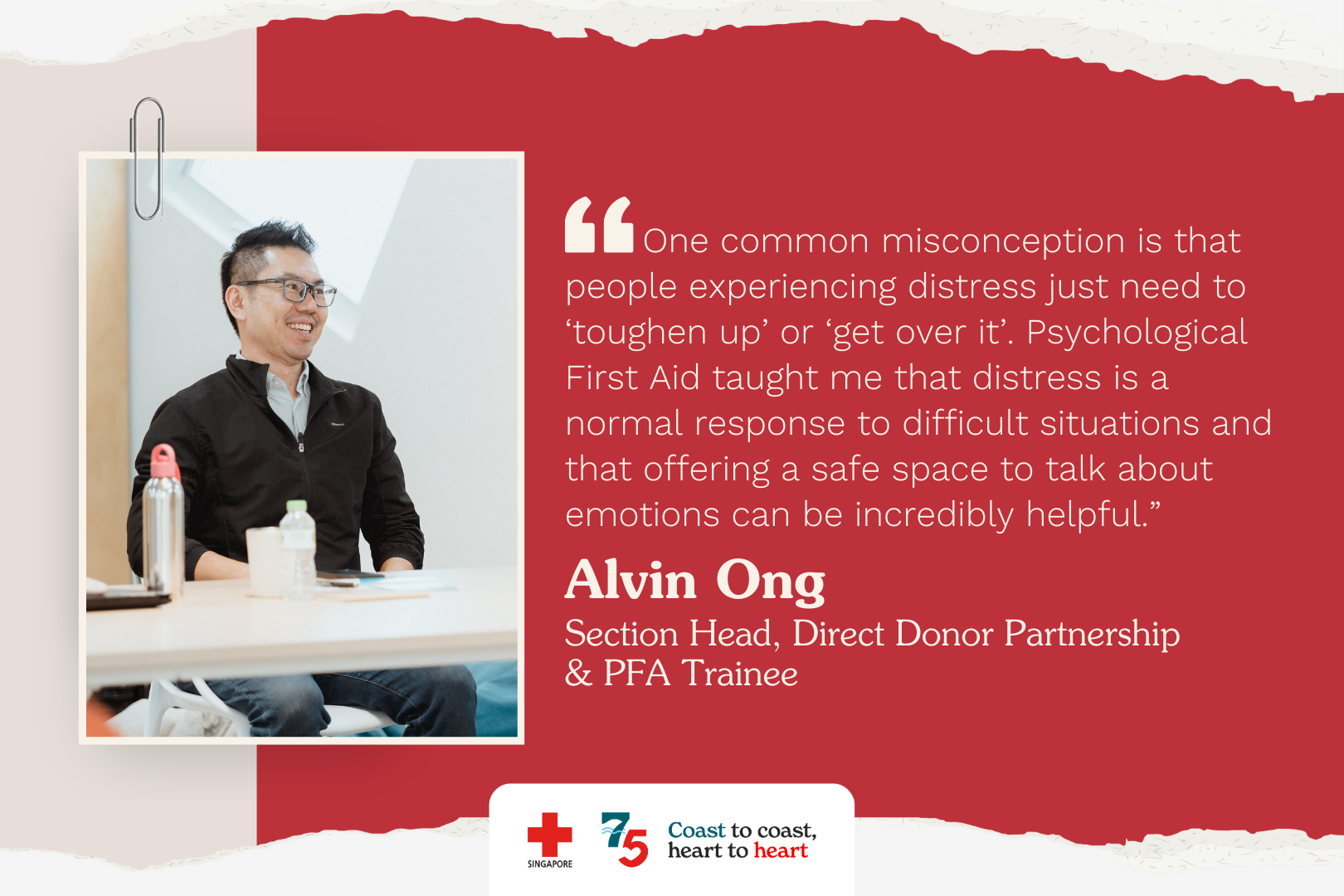
In a world full of emotional turmoil and invisible struggles, Alvin Ong discovered the power of listening and offering compassionate support through Psychosocial First Aid — a skill that goes beyond bandages to heal the unseen scars some may carry.
When you think about first aid, what comes to mind? For most, emergency kits, bandages and even CPR might come up — but what about the wounds that don’t bleed? Resource Development, Direct Donor Partnership Section Head Alvin Ong wondered the same. And as someone who often engaged with donors and the public in his role at the Singapore Red Cross (SRC), he had a desire to be better equipped at offering immediate support to those around him in a compassionate yet non-intrusive way. Enter: Singapore Red Cross Academy (SRCA)’s Psychosocial First Aid (PFA) training.
“I can see why it’s a requirement for SRC staff to be PFA-equipped. Just like how first aid stabilises someone before they get medical treatment, PFA helps stabilise someone emotionally before they seek professional support, if necessary.”
Therapy vs PFA
However, in an era where mental health is finally stepping out of the shadows, it may be easy to mistake PFA for therapy. Thankfully, Alvin was quick to set the record straight. “While both PFA and therapy focus on mental well-being, they serve different purposes. PFA does not diagnose or treat mental health conditions but instead provides immediate and practical emotional support in times of stress or crisis to help people feel heard, understood, and stabilised in the moment. Therapy, on the other hand, is conducted by trained mental health professionals who provide long-term support and treatment for deeper psychological challenges.”
Look, Listen, Link
Upon meeting others in distress, the guiding principles of PFA are simple yet powerful: look, listen, and link. Trainees are encouraged to remember that at the heart of any crisis, whether it’s a personal loss, a stressful event, or even a large-scale disaster — people just need to feel heard and supported.
“It’s about observing someone’s behaviour and surroundings first. Do they need medical help, or simply a glass of water? Then comes the listening — being a calm, steady presence, acknowledging their feelings without judgement. Trainees should then connect the person to support. This could be a spouse, family member, or a professional. The goal is to provide reassurance and stability while respecting their personal space and coping process.”
Yet, Alvin acknowledges that PFA is not just useful for large-scale disasters — it can be applied in everyday life. Alvin cites the workplace as a common scenario where PFA could be adopted when supporting a colleague who is overwhelmed with stress at work. The first step was learning to spot signs of distress that could be manifested in ways that are emotional or physical. Think rapid breathing, confusion, and even withdrawal.
The Power of Active Listening
The training wasn’t all smooth sailing though. “One of the most challenging aspects was resisting the instinct to immediately ‘fix’ someone's problem. I learnt to be mindful in resisting the urge to offer my opinion. Instead, I practice active listening — allowing people to express their emotions without interrupting or rushing to give advice. Practicing this skill helped me become more present in conversations and trust that simply being there for someone can be powerful.”
Love in Action
Role-playing was a technique taught during PFA training to teach trainees how to remain calm and adaptable during a crisis. Alvin recognised its benefits instantly, having experienced effective emotional support himself during a past stressful situation.
“I don’t remember all the details as it was years ago, but I do remember feeling very worked up and worried while speaking with a medical social worker about my mother’s medical situation and hospital bills. But what stood out was how the social worker remained calm and empathetic throughout our conversation. Instead of reacting to my frustration, she listened patiently, acknowledged my concerns, and provided reassurance. Her steady presence and tone of voice helped me feel more at ease — even to the point where I felt bad later on for losing my cool!”
Self-Care is Beneficial
In order to be a more effective source of support for others, Alvin learnt to be more deliberate about setting boundaries and taking breaks. By allowing himself more grace and space, he is able to extend the same to others. “One common misconception is that people experiencing distress just need to ‘toughen up’ or ‘get over it’. PFA taught me that distress is a normal response to difficult situations and that offering a safe space to talk about emotions can be incredibly helpful.”
From boardrooms to living rooms, Alvin learnt that a little empathy can go a long way — one conversation at a time. He dreams of a day where individuals are all PFA-trained, and better equipped to support one another during moments of panic and disaster.
If, like Alvin, you’re interested in equipping yourself with Psychological First Aid and First Aid training so you can be a light in your community, do check out our website here and sign up!
By Eunice Sng, Marketing & Communications

